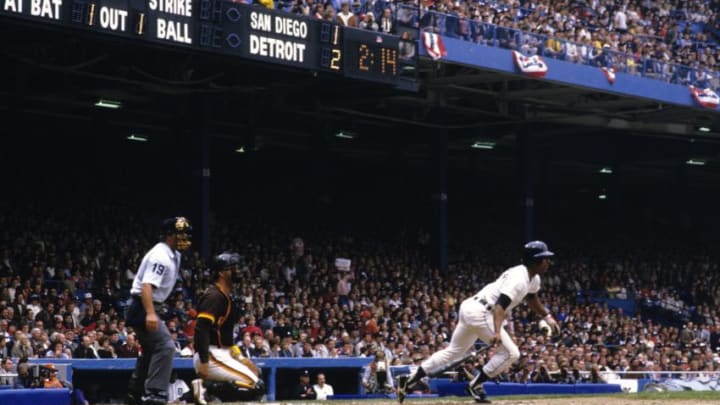The MLB all-time bracket challenge: Part 1
By Bill Felber

The MLB All-Time Bracket Challenge (Part 1)
1984 Detroit Tigers vs. 1969 Baltimore Orioles
The 1984 Tiger team was one of the dominant ballclubs of any era. Winning 35 of its first 40 games, Sparky Anderson’s club laughed to the AL East title by 15 games over Toronto, brushed aside the Kansas City Royals in three games in the ALCS, then finished off the National League champion San Diego Padres in five World Series games.
The Tigers’ secret was pitching. The 3.49 team ERA easily led the American League. Jack Morris and Dan Petry combined for 37 wins, and closer Willie Hernandez won both the Cy Young and MVP with 32 saves and a 1.92 ERA I 80 appearances totaling 140 innings.
Offensively, the Tigers had Alan Trammell (.314) at short and Kirk Gibson (91 RBIs, 29 steals) providing a rare combination of power and speed.
In the franchise bracket challenge, the 1984 club roughed up the 2011 Tigers in four straight, beat the 1934 Tigers in five and swept the 1935 World Series winners for the franchise title.
In the first round, they are pitted against the 1969 Baltimore Orioles. Among the great Orioles teams of the 1970 era dynasty, the 1969 club was probably the best. Granted, it famously was upset by the New York Mets in that fall’s World Series. But the Orioles won a franchise-record 109 games.
Frank Robinson and Brooks Robinson were the on-field leaders. Frank batted .308 with 32 home runs and 100 RBIs, while Brooks added 84 RBIs and played a spectacular third base. At first, Boog Powell batted .304 with 37 homers and 121 RBIs.
The pitching staff was deep. Left-handers Mike Cuellar and Dave McNally combined for 43 victories in 559 innings of work. Jim Palmer added a 16-4 record from the right side.
In the bracket challenge, the 1969 club boat-raced the 1944 St. Louis Browns in four games, eliminated the 2014 team, also in four straight, and completed its bracket sweep by taking out the 1966 World Series winners, again in four.
Game 1: The 1969 Orioles dominated their regular season, winning 109 games, a .673 percentage. As good as the 1984 Tigers were – and they won 104 – the 1969 Orioles had them by five games.
Game 2: The 1984 Tigers got even in post-season, sweeping past the Kansas City Royals in three and the San Diego Padres in five. That’s a .875 post-season percentage. The 1969 Orioles famously stumbled through five World Series games against the Mets after sweeping Minnesota, a .500 post-season performance. The series stands even 0ne game each.
Game 3: The 1984 Tigers’ balanced attack included Kirk Gibson (142) and Alan Trammell (136). That led to team 114 OPS+. The 1969 Orioles had Frank Robinson (165) and Boog Powell (160). But Brooks Robinson and shortstop Mark Belanger were sub-par offensively, the full roster only adding up to a 110 OPS+.
Game 4: The 1969 Orioles leaned on their pitching, with good reason. Palmer had a 152 ERA+ and Cuellar reached 149. The staff score was 126. Detroit’s pitching, by comparison, was mediocre, scoring only 114. The series is again even, at two games each.
Game 5: Frank Robinson scored a 7.5 WAR and Paul Blair followed at 7.1 for the 1969 club. Boog Powell produced 5.9. That spurred a team total of 61.2. The 1984 Tigers, at 51.8, couldn’t come close to matching that.
Game 6: The 1984 Tigers fielded .979, exactly equal to the American League percentage. The 1969 Orioles fielded .984, but that was six points higher than the league percentage that season.
Result: 1969 Orioles in six games